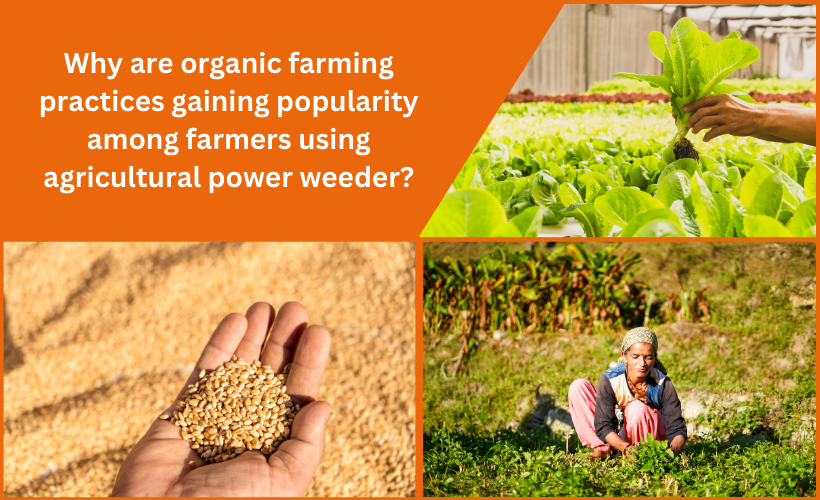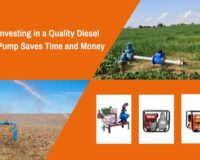Organic farming is no longer a niche concept; it’s a transformative movement shaping the future of agriculture. As farmers worldwide recognize the benefits of sustainability, health, and profitability, organic practices are becoming the norm. Alongside these changes, innovative tools like the cold fogger machine, agriculture motor pump, and agricultural power weeder are helping farmers maximize productivity while maintaining eco-friendly practices.
This article explores why organic farming is gaining popularity, the best tools for organic farmers, and the reasons more farmers are switching to these sustainable methods.
Why Are Organic Farming Practices Gaining Popularity Among Farmers?
A Shift in Consumer Preferences
Consumers today are more informed and prioritize health and sustainability. This growing awareness has created a surge in demand for organic products. The absence of synthetic pesticides, GMOs, and harmful chemicals makes organic food a preferred choice for health-conscious individuals.
Higher Profit Margins
Farmers are turning to organic practices to capitalize on premium pricing. Organic products typically fetch higher market rates, making it a lucrative option. Moreover, tools like the cold fogger machine simplify pest management, reducing long-term costs while adhering to organic standards.
Environmental Sustainability
Organic farming minimizes environmental degradation. Techniques like composting and crop rotation preserve soil health, while organic pest control methods help maintain ecological balance. These practices contribute to a healthier planet and a sustainable farming system.
Farm Smarter, Not Harder: Why Organic is the Future
The traditional farming model often overuses resources, leading to soil exhaustion and ecological damage. Organic farming, however, offers a sustainable alternative that prioritizes both productivity and environmental stewardship.
Healthier Farming Ecosystems
Organic methods emphasize maintaining soil fertility and biodiversity. Using equipment like the agriculture motor pump, farmers can ensure efficient irrigation while conserving water, a critical resource in sustainable agriculture.
Reduction in Chemical Dependency
By avoiding synthetic pesticides and fertilizers, organic farming promotes a cleaner environment. It leverages natural alternatives, such as biological pest control, to maintain crop health without harming the surrounding ecosystem.
Best Tools for Organic Farmers to Get the Most from Their Crops
Modern organic farming is supported by innovative tools and techniques designed to maximize productivity while staying eco-friendly. Here’s a look at some must-have tools:
1. Crop Rotation and Soil Health
Crop rotation not only improves soil health but also reduces the prevalence of pests and diseases. This simple yet effective method is a cornerstone of organic farming.
2. Efficient Pest Management
Pest control in organic farming is often achieved using natural methods. Devices like the cold fogger machine disperse organic pest repellents effectively, covering large areas without harming the environment.
3. Weed Management Tools
Weeds are a persistent challenge in farming. With the help of an agricultural power weeder, farmers can manage weeds efficiently, ensuring better crop growth without the need for chemical herbicides.
4. Sustainable Irrigation Solutions
Water management is vital in organic farming. The agriculture motor pump ensures that crops receive adequate water without waste, making it a critical tool for sustainable irrigation.
5. Composting Systems
Turning organic waste into nutrient-rich compost is an essential practice. This method enriches the soil naturally, reducing reliance on synthetic fertilizers.
Why Farmers Are Making the Switch to Organic Farming Practices
1. Improved Health and Safety
Organic farming eliminates the use of harmful chemicals, protecting farmers and their families from exposure to toxic substances. This shift also ensures healthier produce for consumers.
2. Environmental Benefits
Switching to organic farming helps reduce pollution, conserve water, and improve soil health. Tools like the cold fogger machine aid in maintaining ecological balance while controlling pests naturally.
3. Economic Viability
With rising consumer demand, organic farming offers better profitability. Premium pricing and lower input costs, especially when using efficient tools like the agricultural power weeder, make it an economically sound choice.
4. Building Consumer Trust
Organic certification assures consumers of product quality, fostering trust and loyalty. Farmers who adopt organic practices can build strong relationships with their customer base.
Conclusion
Organic farming is more than just a trend; it’s a sustainable solution for the future of agriculture. By reducing chemical dependency, improving soil health, and using advanced tools like the cold fogger machine, agriculture motor pump, and agricultural power weeder, farmers can achieve higher yields and profitability. The shift to organic practices benefits not only farmers but also the environment and society as a whole.
FAQs
Q1. How do organic farmers fertilize?
Organic fertilizers include animal by-products, plant-derived materials, and mined minerals. These can be purchased individually or as fertilizer blends. Many of these materials also contain other nutrients, and some contain carbon, which will help maintain soil OM and soil structure.
Q2. Which is the best method in organic farming to remove weeds?
Hand hoes, push, hoes, and hand-weeding are still used when rouging an individual plant or patch of weed, which is the most effective way of preventing the weed from spreading. Hand-weeding may also be used after mechanical inter-row weeding to deal with weeds left in the crop row.




